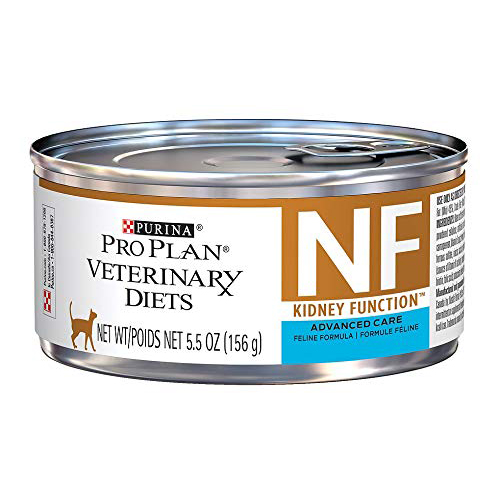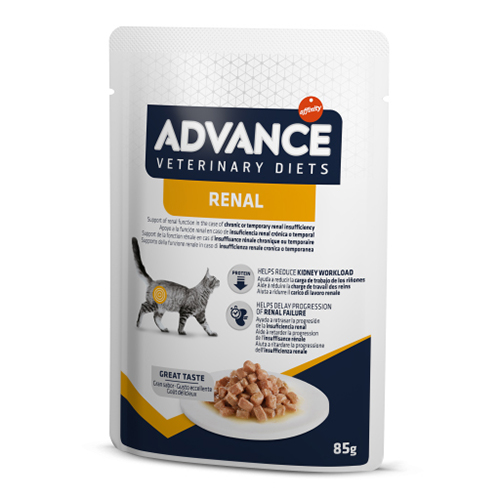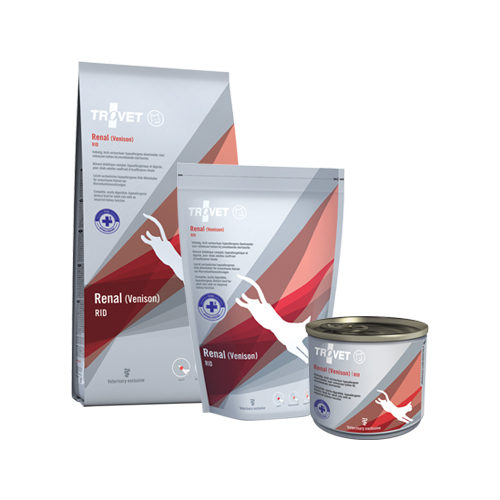Fix Unexplained, Persistent Vomiting and Diarrhea in Cats
16 Jun


Posted By
37 Comment(s)
37361 View(s)
Symptoms & Treatments
,
Diet & Nutrition
,
Related Disease
,
Daily Care
Gastroenteritis, Pancreatitis, and IBD (Inflammatory Bowel Disease) are increasingly becoming common illnesses among cats. These diseases can cause a wide range of symptoms, including vomiting, diarrhea, weight loss and lethargy. Unfortunately, veterinarians often are unable to find the underlying cause of a problem. Therefore, it is important for cat owners to be aware of their pet's food intake.
In this article, we will discuss the causes of these occurrences and how to prevent them from happening again.
Identify the source of allergy:
To begin with, it is essential to identify the source of allergy.
Many cat food products contain ingredients that are very taxing on the pancreas, yet many veterinarians and professionals are unaware of this, causing your cat's digestive system to become upset.
Check your cat's food and see if it contains the following high-allergy ingredients:
Wheat, Cereal, Corn Starch, Quinoa , Gluten
Especially if your cat is on a renal diet, the two common brands of renal food, contain the aforementioned high-allergy foods.
Dry food has a higher possibility of containing high-allergy ingredients; in fact, there are only a very few cat renal dry foods that don't contain them.
If a food item contains any of the ingredients listed above, it is advisable for your cat to stop using it and refrain from consuming it. Observe the new food for a couple more weeks, and see if your cat is doing better.
Reasons why those ingredients have a problem:
The reason for the upset stomach is that the above ingredient would overload the cat's digestive system, requiring an excessive amount of bile secretion. The cat's digestive system might have been able to handle it when they were younger, but after years, the work became too much for it to process.
However, it has been found that cats with kidney disease are more likely to develop Pancreatitis than cats without kidney disease. That's why a cat with kidney disease should be monitored more carefully to avoid overworking the pancreas.
Professionals are unable to find the underlying cause of a problem:
After having been on RC renal food for four years, Voodoo started to experience persistent vomiting and diarrhea. He was initially diagnosed with gastroenteritis, but after the vet took a closer look, he was diagnosed with serious pancreatitis. The vet performed an ultrasound and a test called "spec fpl" (an accurate test conducted by a lab in the USA).
My cat, Voodoo, had recurrent pancreatitis issues and after 1.5 years of trying to locate the cause and eliminating foods that might be causing it, I eventually figured out it was certain ingredients. Even though I consulted different vets, including Chinese medicine experts, nothing seemed to stop the episodes from occurring. After Voodoo had the proper diet, he recovered quickly and was back to normal. However, if he had the wrong food again, he would start vomiting and having diarrhea, so I had to be very mindful of the food ingredients before giving it to him.
This illnesses very common in cats nowaday:
Since many pet foods contain the above ingredient, it is becoming increasingly common for cats to have sensitive stomachs.
Some of my friends' cats have the same issue: persistent vomiting, diarrhea, sleeping all the time, losing weight, and a lack of appetite. The vet recommended a lot of tests, but there was no solution. Upon avoiding ingredients that caused allergies, they noticed a positive change in her cat's health and behavior.
When I took Voodoo for her regular checkup, I encountered many other cat owners with the same problem - unexplained and serious vomiting and diarrhea. It appears they are baffled by the problem and no solutions have been provided. If you're reading this post experiencing the same thing, my hope is that it can provide some useful information to help you resolve the mysterious issue.
How to make your cat feel better and Heal faster:
Use medications, such as Cerenia, to stop vomiting first.
Pancreas secretes enzymes to digest food and produce insulin. Every time the cat vomits, its pancreas is prompted to secrete enzymes again. Excessive vomiting can also damage pancreatic cells. In order to prevent further damage to the pancreas, it is important for cats with pancreatitis to stop vomiting as soon as possible. This can be done through dietary changes, medication, and other treatments that are tailored to the individual cat's needs. Cerenia is an medicine that can effectively suppress vomiting.
Fast for at least 8-16 hours and avoid high-allergenic foods afterward.
Cats suffering from a pancreatitis episode need to fast for at least eight hours in order to give the pancreas some rest. It is important that cats are not given any food during this time, as this can put extra strain on the already weakened organ.
Use Omeprazole or Slippery Elm Bark for excess stomach acid
Pancreatitis and Kidney Disease can both cause severe stomach acid build-up. This can cause a lot of discomfort for cats, making them feel unwell. Fortunately, there is a way to reduce this acid build-up and make cats feel better - by using Omeprazole or Slippery Elm Bark.
Most importantly, avoid giving your cat the following ingredients:
Wheat, Cereal, Corn Starch, Quinoa , Gluten
Food recommendations for cat renal diet and sensitive stomach:
The first choices will be ProPlan and Advance renal wet cat food.


There are only a few cat renal dry foods that don't contain high-allergy ingredients. Trovet renal dry food is one of them. Additionally, Trovet has renal wet food, which has a relatively low phosphorus level, but is still higher than ProPlan and Advance.


37 Comment(s)
It's very trouble-free to find out any topic on web as compared to textbooks, as I found this paragraph at this web site.
I am sure this piece of writing has touched all the internet people, its really really fastidious article on building up new blog.
I’ll right away grasp your rss feed as I can not find your e-mail subscription hyperlink or newsletter service. Do you’ve any? Please allow me realize in order that I could subscribe. Thanks.
I like it whenever people get together and share opinions. Great blog, continue the good work!
These are truly fantastic ideas in concerning blogging. You have touched some nice factors here. Any way keep up wrinting.
I am continually invstigating online for posts that can assist me. Thx!
I’ll immediately seize your rss as I can’t to find your email subscription link or newsletter service. Do you have any? Kindly let me recognise so that I could subscribe. Thanks.
What's up to all, the contents present at this web page are actually remarkable for people knowledge, well, keep up the good work fellows.
I’ll right away take hold of your rss feed as I can not in finding your email subscription link or e-newsletter service. Do you have any? Kindly let me realize so that I may just subscribe. Thanks.
Wow, this piece of writing is nice, my younger sister is analyzing these things, therefore I am going to tell her.
Hi there, You have done an excellent job. I'll certainly digg it and personally suggest to my friends. I am confident they will be benefited from this site.
Greetings! Very helpful advice within this article! It's the little changes which will make the most significant changes. Thanks for sharing!
I will right away clutch your rss as I can not in finding your email subscription hyperlink or newsletter service. Do you’ve any? Kindly let me know so that I may subscribe. Thanks.
Hello, I check your blogs on a regular basis. Your writing style is witty, keep doing what you're doing!
Everything is very open with a precise clarification of the issues. It was really informative. Your website is very useful. Thank you for sharing!
saying he didn't want to lose yards or commit a penalty that would push his team out of field goal range.
I really like it when folks get together and share views. Great website, continue the good work!
If some one wishes to be updated with newest technologies therefore he must be go to see this web site and be up to date all the time.
I visited many web sites however the audio quality for audio songs present at this web site is really excellent.
Hi, I log on to your blogs on a regular basis. Your humoristic style is witty, keep up the good work!
I wanted to thank you for this wonderful read!! I absolutely loved every little bit of it. I have got you book-marked to check out new stuff you
Ahaa, its fastidious conversation concerning this post at this place at this website, I have read all that, so at this time me also commenting here.
Spot on with this write-up, I seriously believe this website needs far more attention. I'll probably be returning to see more, thanks for the information!
Yeah bookmaking this wasn't a speculative conclusion outstanding post!
I will immediately grasp your rss feed as I can not find your email subscription link or newsletter service. Do you’ve any? Please allow me realize in order that I may subscribe. Thanks.
I'm gone to inform my little brother, that he should also visit this website on regular basis to take updated from most up-to-date reports.
Wow! This blog looks just like my old one! It's on a totally different subject but it has pretty much the same page layout and design. Excellent choice of colors!
I visited multiple web sites but the audio quality for audio songs existing at this web page is in fact superb.
I see your blog needs some fresh & unique content. Writing manually is time consuming, but there is solution for this. Just search for; Masquro's strategies
Everyone loves what you guys are up too. This kind of clever work and exposure! Keep up the amazing works guys I've included you guys to my own blogroll.
What's up it's me, I am also visiting this web page on a regular basis, this web site is genuinely nice and the visitors are in fact sharing good thoughts.
I enjoy what you guys tend to be up too. This type of clever work and coverage! Keep up the superb works guys I've added you guys to my personal blogroll.
Because of for the url! The function went beautifully and loads of food items was eaten. Subsequent celebration is June 22 — continue to keep your eyes peeled for the subsequent cooks.
I will immediately seize your rss feed as I can not in finding your e-mail subscription hyperlink or e-newsletter service. Do you’ve any? Please permit me understand in order that I may just subscribe. Thanks.
I am sure this piece of writing has touched all the internet people, its really really good article on building up new blog.
It's very easy to find out any matter on net as compared to books, as I found this paragraph at this site.
I will right away snatch your rss feed as I can not to find your email subscription link or e-newsletter service. Do you've any? Please let me know so that I may subscribe. Thanks.
Leave a Comment